Can we get a fixed IP address if we use a VPN?
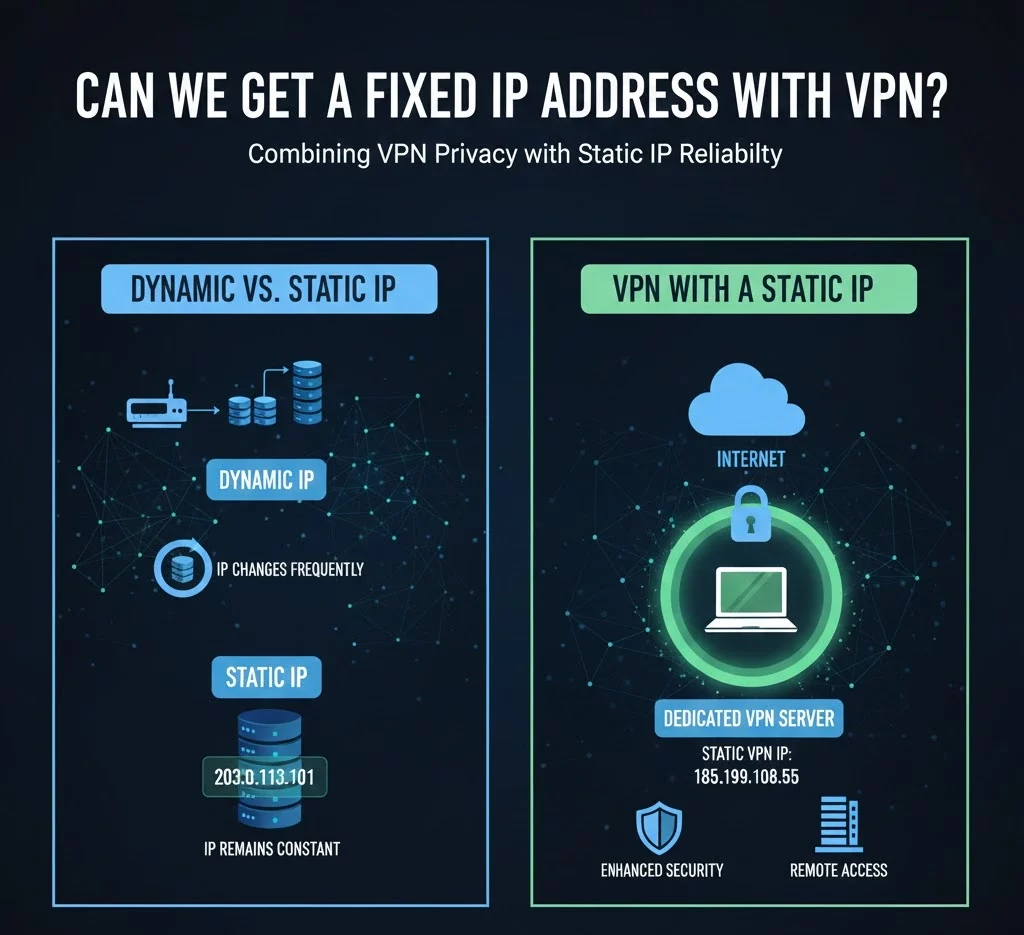
In the world of internet connectivity and digital privacy, Virtual Private Networks (VPNs) have become a staple tool for many users. One common question that arises is whether it’s possible to obtain a fixed IP address when using a VPN.
Table of Contents
The answer is yes, but it depends on the VPN service provider you choose. In this article, we’ll explore how you can get a fixed IP address with a VPN, the benefits, and potential considerations.
Understanding Fixed IP Addresses via VPN
Dynamic vs. Static IP Addresses
When you connect to the internet, your device is assigned an IP address, which can either be dynamic or static.
Dynamic IP Address: Most standard VPN services provide dynamic IP addresses. This means the IP address assigned to you changes each time you connect to the VPN. While this enhances privacy, it can be inconvenient for activities requiring a consistent IP address.
Static IP Address: Some VPN providers offer static or fixed IP addresses. With a static IP, you get the same IP address each time you connect to the VPN, offering consistency and reliability.
Benefits of a Fixed IP Address
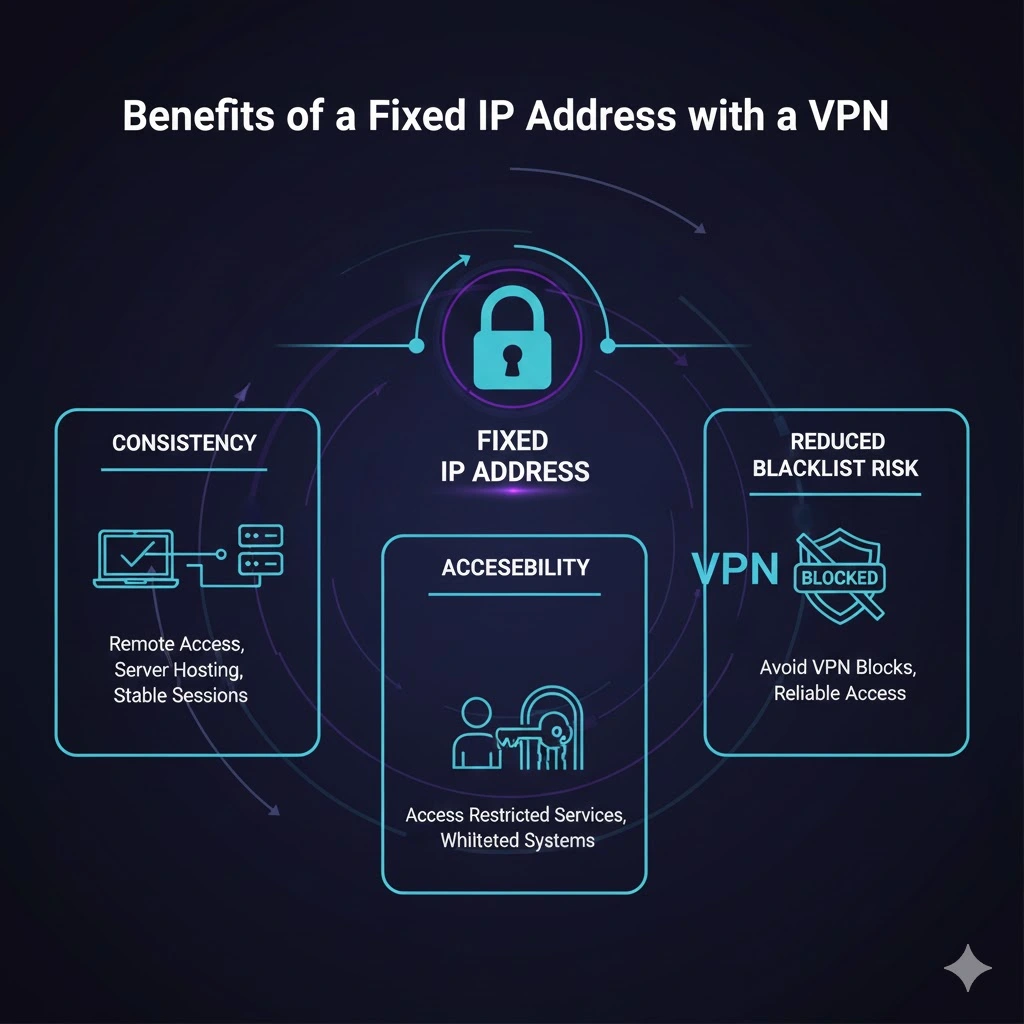
There are several advantages to using a fixed IP address through a VPN:
Consistency: A fixed IP address ensures that your IP address remains the same across sessions. This is particularly useful for remote access to systems, running a server, or accessing certain online services that require a consistent IP.
Accessibility: Fixed IP addresses make it easier to access certain services and systems that are restricted to specific IP addresses.
Reduced Risk of IP Blacklisting: Some websites and services might block dynamic IP addresses frequently used by VPNs. A fixed IP can reduce the risk of being flagged or blocked.
How to Get a Fixed IP Address with a VPN
Choose a VPN Provider: Look for VPN providers that offer static IP addresses as part of their service. Some popular VPN providers offering this feature include:
- NordVPN: Offers dedicated IP addresses in multiple countries.
- PureVPN: Provides dedicated IP options.
- CyberGhost: Has dedicated IP addresses available.
- TorGuard: Known for its dedicated IP address options.
Subscription Plans: Static IP addresses often come at an additional cost compared to standard VPN plans. Review the pricing and select a plan that includes a static IP feature.
Select Your Preferred Location: Depending on the provider, you may have options for the geographic location of your fixed IP address. Choose a location that suits your needs, whether for business or personal use.
Setup and Configuration: Once you’ve subscribed to a plan with a fixed IP address, follow the provider’s instructions to configure your VPN client. This usually involves logging in with your account details and selecting the static IP option.
Potential Limitations
While a fixed IP address can be beneficial, there are some potential limitations to consider:
Privacy Considerations: Using a fixed IP address can reduce some aspects of anonymity, as your online activities will consistently be associated with the same IP address. This could potentially make tracking easier.
Additional Costs: Static IP addresses typically come with an additional cost. Ensure the benefits align with your needs before committing to the extra expense.
In a nutshell, yes, you can get a fixed IP address with a VPN if you choose a provider that offers this service. It provides the advantage of consistency and reliability, which can be beneficial for various online activities. However, weigh the benefits against any potential privacy concerns and additional costs.
For more information on managing IP addresses and enhancing your network security, consider exploring the resources available at larus.net. They offer comprehensive solutions and expert advice tailored to your IP address management needs.
Trusted IPv4 Leasing for Business Growth
Get enterprise-grade IPv4 space quickly, with seamless deployment and end-to-end management.
Get Started with i.leaseFAQs
What is the difference between a Static IP and a Dedicated IP?
While often used interchangeably, there is a subtle difference. A Static IP just means the address doesn’t change. A Dedicated IP is a static IP that is exclusively assigned to you and not shared with any other users. Most premium VPNs offer “Dedicated IPs” to ensure you don’t get punished for the bad behavior of other users sharing the same server.
Is a fixed IP address safer than a dynamic one?
Not necessarily. A Dynamic IP (shared) offers better anonymity because your traffic is mixed with hundreds of other users, making you harder to track. A Fixed IP is easier to track back to your specific account, but it provides better usability for accessing secure networks, online banking, and remote desktop tools.
Can I use a fixed IP VPN for online banking?
Yes, and it is highly recommended. Banks often flag accounts that log in from different IP addresses (locations) as suspicious fraud attempts. Using a Fixed IP helps you avoid these security lockouts by providing a consistent, trusted location for every login.
Related Posts
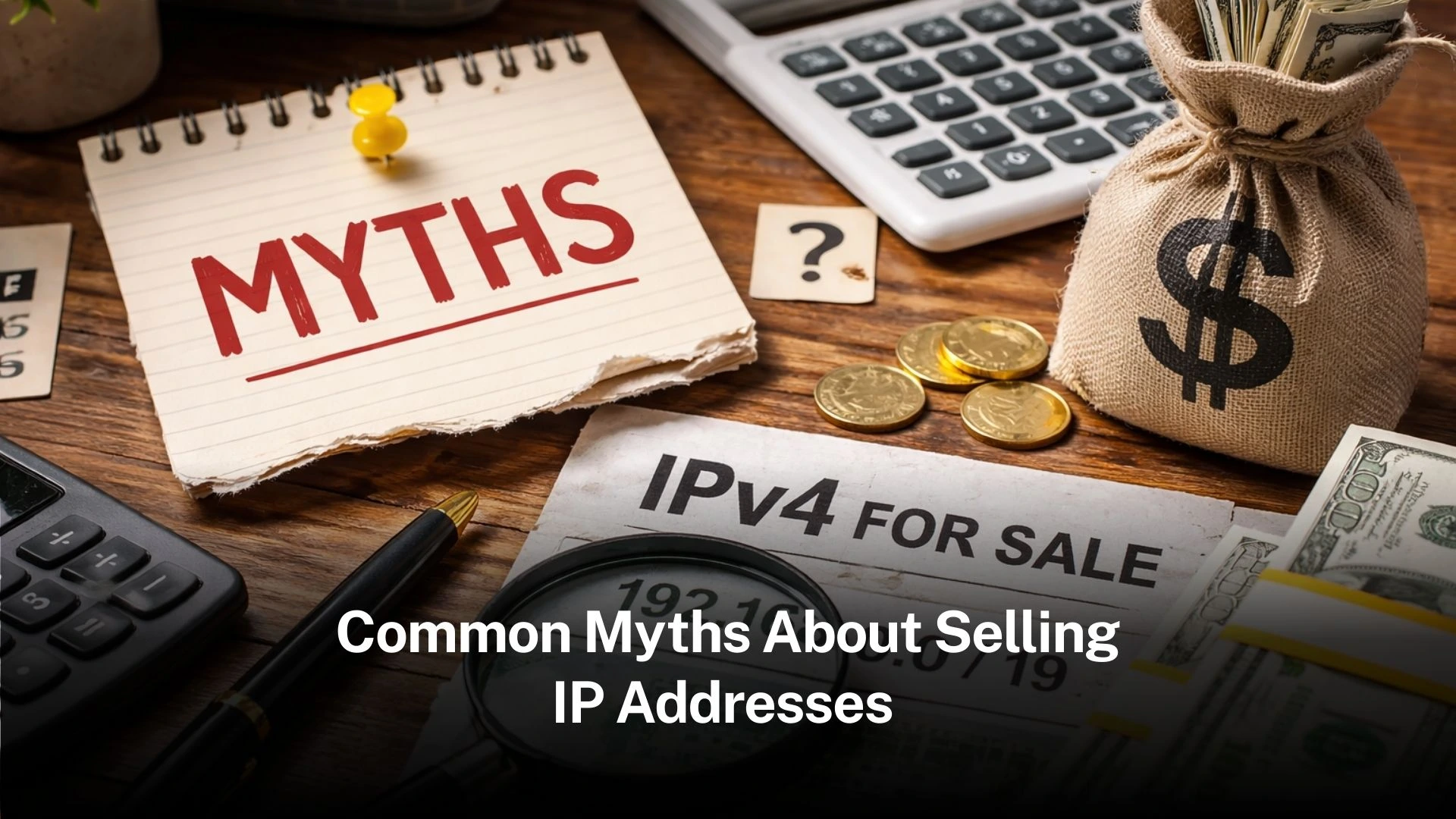
Common Myths About Selling IP Addresses
The IPv4 secondary market is often shrouded in mystery, leading many organizations to sit on valuable digital assets because they fear the perceived complexity or legal “gray areas.” As IPv4 exhaustion becomes a permanent reality, the value of these addresses has skyrocketed, yet misconceptions continue to stall potential transactions. At i.lease, powered by the real-world expertise of LARUS, we’ve seen how these myths prevent companies from unlocking significant capital.Read more Related Posts Common Myths About Selling IP Addresses The IPv4 secondary market is often shrouded in mystery, leading many organizations to sit on valuable digital assets because they Read more How to buy IPv4 addresses through a certified IP broker Buying IPv4 space requires policy compliance, verified need, and registry approval, making certified IP brokers essential guides through complex global Read more What happens when IP resources are mismanaged Poor IP resource management can lead to outages, security breaches, blacklisting, legal exposure and reputational damage across networks and business Read more .related-post {} .related-post .post-list { text-align: left; } .related-post .post-list .item { margin: 5px; padding: 10px; } .related-post .headline { font-size: 18px !important; color: #999999 !important; } .related-post .post-list .item .post_thumb { max-height: 220px; margin: 10px 0px; padding: 0px; display: block; } .related-post .post-list .item .post_title { font-size: 16px; color: #3f3f3f; margin: 10px 0px; padding: 0px; display: block; text-decoration: none; } .related-post .post-list .item .post_excerpt { font-size: 13px; color: #3f3f3f; margin: 10px 0px; padding: 0px; display: block; text-decoration: none; } @media only screen and (min-width: 1024px) { .related-post .post-list .item { width: 30%; } } @media only screen and (min-width: 768px) and (max-width: 1023px) { .related-post .post-list .item { width: 90%; } } @media only screen and (min-width: 0px) and (max-width: 767px) { .related-post .post-list .item { width: 90%; } }
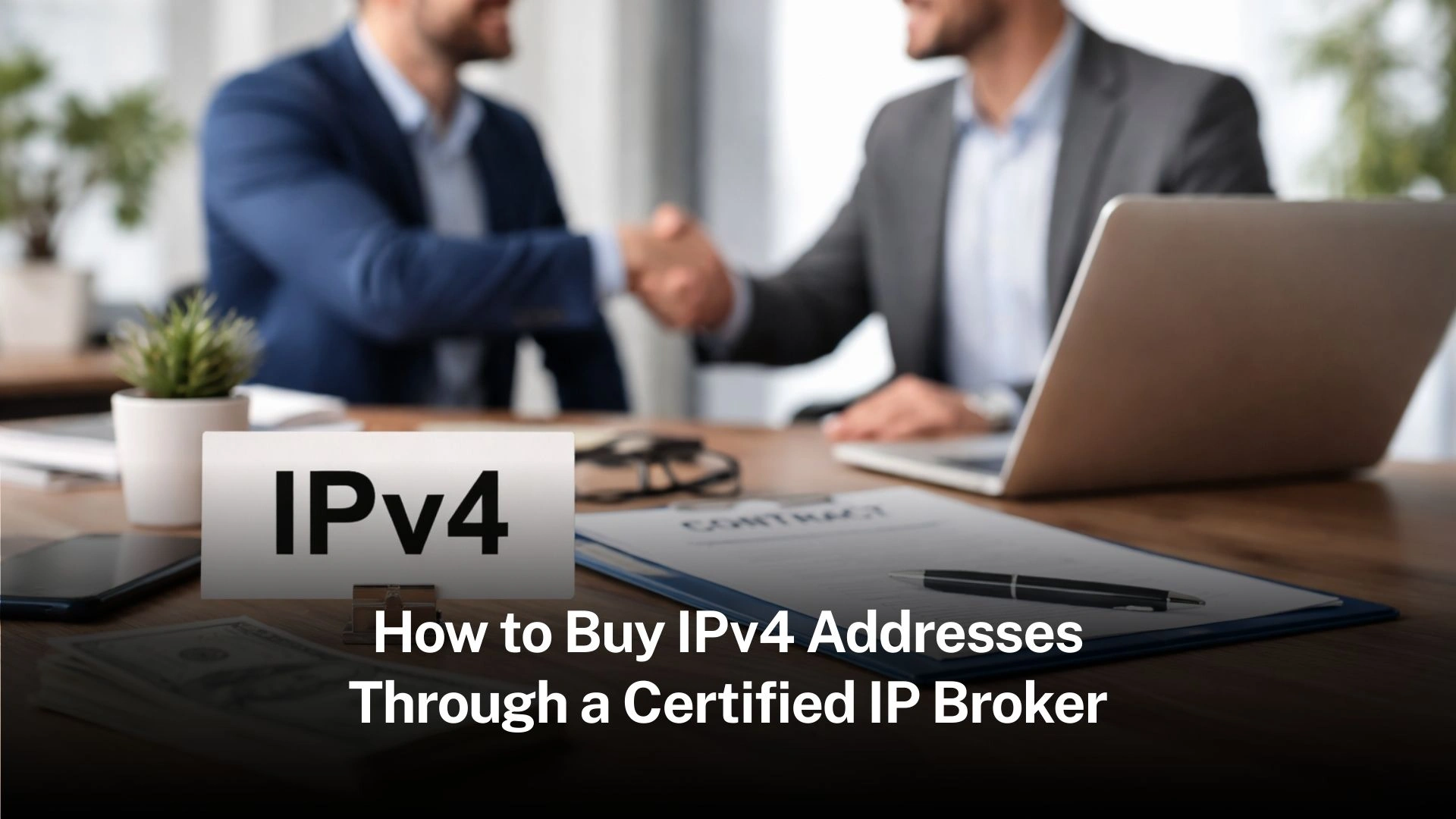
How to buy IPv4 addresses through a certified IP broker
Buying IPv4 space requires policy compliance, verified need, and registry approval, making certified IP brokers essential guides through complex global transfers. IPv4 transactions are regulated transfers, not simple purchases — registries must approve documentation, justification and registration changes. Certified brokers reduce risk and delay by aligning buyers with registry policy, routing legitimacy and cross-region requirements. Why companies still need to buy IPv4 addresses The global supply of IPv4 addressesRead more Related Posts Common Myths About Selling IP Addresses The IPv4 secondary market is often shrouded in mystery, leading many organizations to sit on valuable digital assets because they Read more How to buy IPv4 addresses through a certified IP broker Buying IPv4 space requires policy compliance, verified need, and registry approval, making certified IP brokers essential guides through complex global Read more What happens when IP resources are mismanaged Poor IP resource management can lead to outages, security breaches, blacklisting, legal exposure and reputational damage across networks and business Read more .related-post {} .related-post .post-list { text-align: left; } .related-post .post-list .item { margin: 5px; padding: 10px; } .related-post .headline { font-size: 18px !important; color: #999999 !important; } .related-post .post-list .item .post_thumb { max-height: 220px; margin: 10px 0px; padding: 0px; display: block; } .related-post .post-list .item .post_title { font-size: 16px; color: #3f3f3f; margin: 10px 0px; padding: 0px; display: block; text-decoration: none; } .related-post .post-list .item .post_excerpt { font-size: 13px; color: #3f3f3f; margin: 10px 0px; padding: 0px; display: block; text-decoration: none; } @media only screen and (min-width: 1024px) { .related-post .post-list .item { width: 30%; } } @media only screen and (min-width: 768px) and (max-width: 1023px) { .related-post .post-list .item { width: 90%; } } @media only screen and (min-width: 0px) and (max-width: 767px) { .related-post .post-list .item { width: 90%; } }
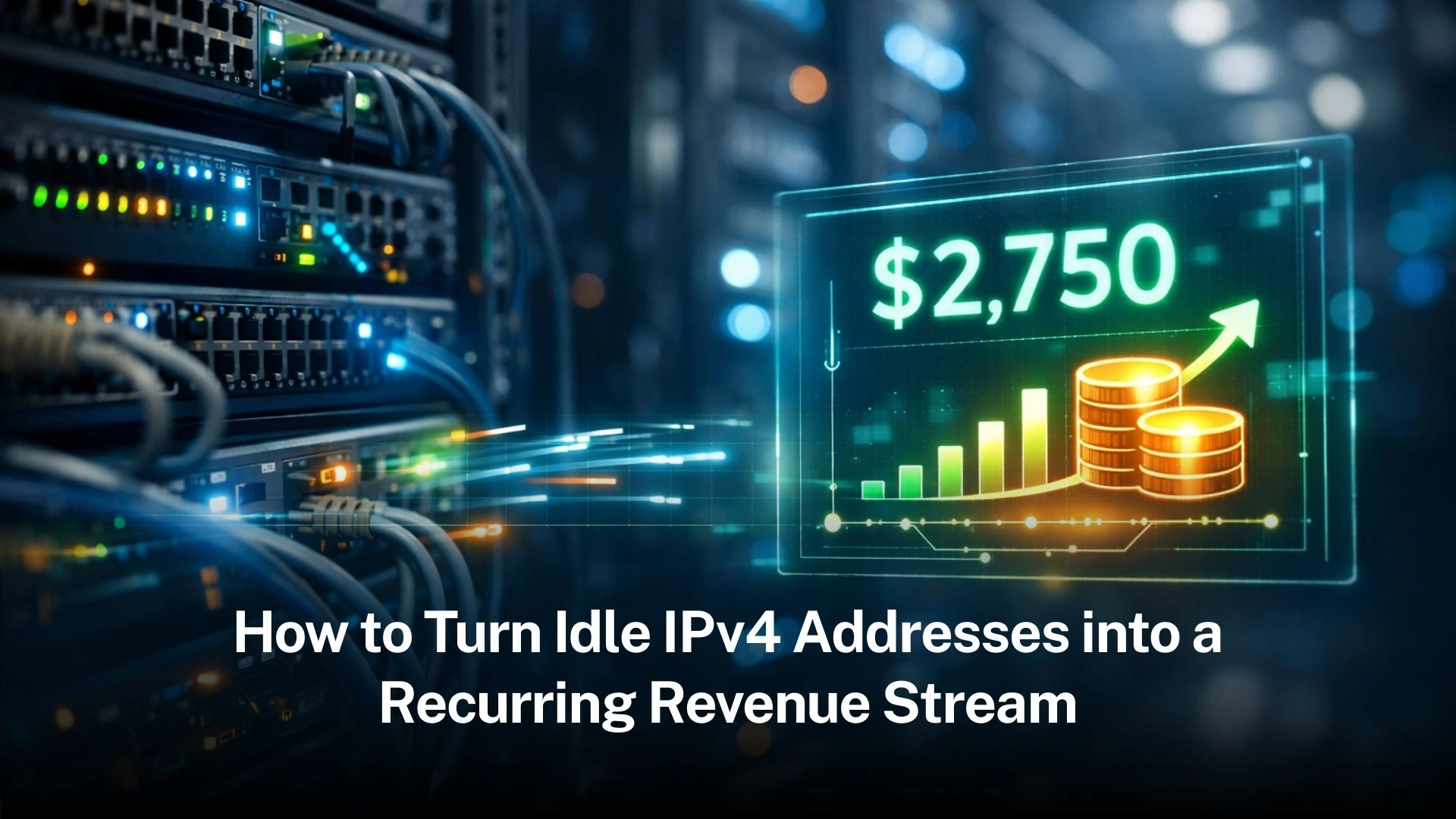
How to turn idle IPv4 addresses into a recurring revenue stream with iLease
Unlock the hidden value of unused IPv4 addresses with iLease, turning dormant digital infrastructure into a recurring revenue stream while navigating market demand, compliance and risk. Leasing idle IPv4 blocks can generate steady, long-term income without relinquishing ownership. Platforms like i.lease global IPv4 marketplace make it easier to monetise addresses and manage reputation and compliance. why IPv4 addresses still matter Despite the long-anticipated exhaustion of the IPv4 address space — aRead more Related Posts Common Myths About Selling IP Addresses The IPv4 secondary market is often shrouded in mystery, leading many organizations to sit on valuable digital assets because they Read more How to buy IPv4 addresses through a certified IP broker Buying IPv4 space requires policy compliance, verified need, and registry approval, making certified IP brokers essential guides through complex global Read more What happens when IP resources are mismanaged Poor IP resource management can lead to outages, security breaches, blacklisting, legal exposure and reputational damage across networks and business Read more .related-post {} .related-post .post-list { text-align: left; } .related-post .post-list .item { margin: 5px; padding: 10px; } .related-post .headline { font-size: 18px !important; color: #999999 !important; } .related-post .post-list .item .post_thumb { max-height: 220px; margin: 10px 0px; padding: 0px; display: block; } .related-post .post-list .item .post_title { font-size: 16px; color: #3f3f3f; margin: 10px 0px; padding: 0px; display: block; text-decoration: none; } .related-post .post-list .item .post_excerpt { font-size: 13px; color: #3f3f3f; margin: 10px 0px; padding: 0px; display: block; text-decoration: none; } @media only screen and (min-width: 1024px) { .related-post .post-list .item { width: 30%; } } @media only screen and (min-width: 768px) and (max-width: 1023px) { .related-post .post-list .item { width: 90%; } } @media only screen and (min-width: 0px) and (max-width: 767px) { .related-post .post-list .item { width: 90%; } }